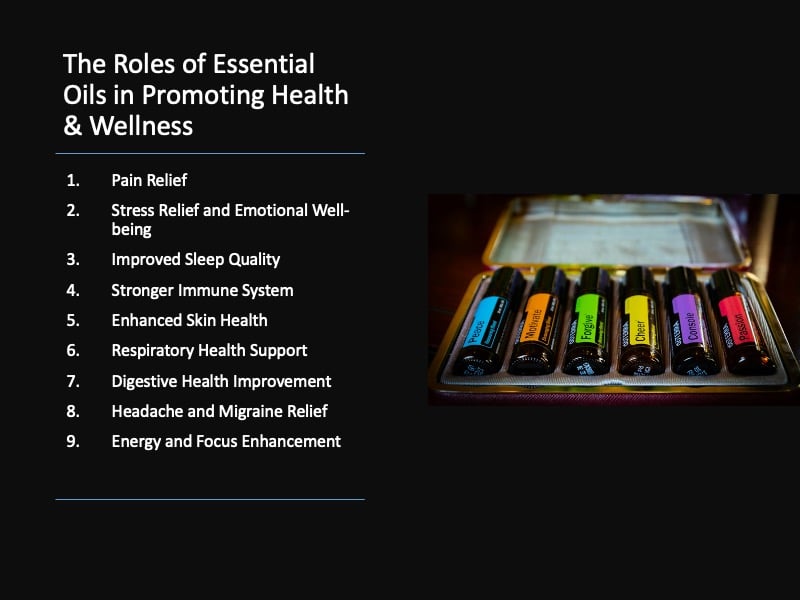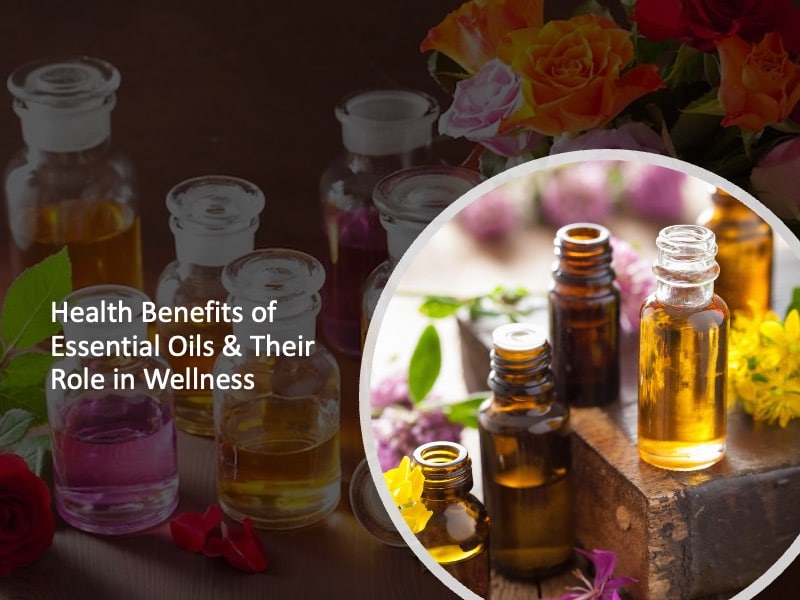Health Benefits of Essential Oils & Their Role in Wellness
Essential oils are plant-derived compounds celebrated for their powerful aroma and wide range of therapeutic properties.
Extracted from flowers, leaves, bark, and other parts of plants, these oils capture the essence of the plant’s natural healing abilities.
In both traditional and modern medicine, essential oils are prized for their versatility. For example, they are used in practices like aromatherapy to influence mood and emotional well-being or applied topically to soothe skin and alleviate pain.
Their antimicrobial and anti-inflammatory properties also make them valuable additions to natural household cleaning products.
From promoting relaxation and stress reduction to improving sleep and enhancing skincare routines, essential oils offer a holistic, plant-based alternative to synthetic products, supporting a healthier lifestyle.
As someone who has relied on natural solutions throughout my career as a professional athlete, I’ve experienced firsthand the health benefits of essential oils in promoting both physical and mental well-being. Amongst other uses, I’ve used lavender essential oil to improve my sleep quality during high-stress basketball seasons and peppermint oil to help relieve muscle tension after intense workouts.
Incorporating these plant-derived compounds into my daily routine has provided a natural way to manage stress and recovery, enhancing my overall performance on and off the court.
Their versatility—from soothing skin to supporting respiratory health—has made essential oils a key part of my holistic approach to health and wellness, allowing me to stay focused, energized, and balanced throughout my athletic career.
The Roles of Essential Oils in Promoting Health & Wellness

There are numerous health benefits of essential oils, depending on the way you decide to use them.
Essential oils offer a natural, versatile approach to health and wellness, providing solutions for pain relief, stress management, skincare, and much more. By understanding how to use these oils safely and effectively, you can incorporate them into your daily routine to enhance both physical and emotional well-being.
As with any natural remedy, it’s essential to practice caution and consult professionals when needed to ensure a safe and beneficial experience.
Here is more information on the health benefits of essential oils:
1.) Pain Relief
Essential oils are highly regarded for their ability to manage different types of pain naturally. These oils can be particularly useful for those looking for holistic alternatives to over-the-counter medications.
- Essential Oils for Joint Pain: Oils like eucalyptus and ginger are commonly used for joint pain relief due to their anti-inflammatory properties. Eucalyptus oil reduces swelling and inflammation in the joints, while ginger oil improves circulation, promoting pain relief and mobility.
- Essential Oils for Back Pain: Peppermint and lavender are among the most effective essential oils for back pain, but several can offer significant relief. Peppermint oil has a cooling effect that relaxes tense muscles, while lavender oil’s calming properties help to reduce pain and stress.
- Essential Oils for Muscle Soreness: Rosemary and chamomile oils are excellent essential oils for muscle soreness. Rosemary stimulates blood flow, easing muscle tension, while chamomile’s anti-inflammatory benefits soothe the affected areas and reduce discomfort.
2.) Stress Relief and Emotional Well-being
Essential oils play a crucial role in stress management and emotional health. Inhaling the scents of oils like lavender, bergamot, orange, grapefruit and ylang-ylang can significantly reduce stress and anxiety levels.
Studies have demonstrated that these oils can affect the brain’s limbic system, which controls emotions and mood, promoting relaxation and a sense of well-being.
3.) Improved Sleep Quality
For those struggling with sleep disorders or insomnia, essential oils like chamomile, sandalwood, and valerian root are natural sleep aids.
Their sedative properties help to calm the mind, reduce anxiety, and prepare the body for a restful night. Simply diffusing these oils in your bedroom before bedtime can improve sleep quality.
4.) Stronger Immune System
Essential oils such as tea tree, eucalyptus, and oregano are packed with antimicrobial and antiviral properties that support the immune system.
Using these oils in diffusers or cleaning solutions can help purify the air and reduce exposure to pathogens, creating a healthier home environment.
5.) Enhanced Skin Health
Many essential oils are beneficial for skin care due to their anti-inflammatory and antioxidant properties. Oils like tea tree, rosehip, and frankincense are commonly used to treat acne, soothe irritated skin, and reduce the appearance of scars and blemishes.
These oils help improve skin tone and texture, making them valuable additions to natural skincare routines.
6.) Respiratory Health Support
For those with respiratory issues, essential oils like peppermint, eucalyptus, and lemon can offer relief.
These oils help clear nasal passages, reduce inflammation, and promote easier breathing. Inhaling steam infused with these oils is particularly effective for treating sinus congestion and cold symptoms.
7.) Digestive Health Improvement
Essential oils like ginger, peppermint, and fennel are well-known for their digestive benefits. They can help alleviate symptoms of bloating, indigestion, and nausea by stimulating the digestive system and promoting the production of enzymes.
Peppermint oil, in particular, is often used to relieve the discomfort of irritable bowel syndrome (IBS).
8.) Headache and Migraine Relief
Peppermint and lavender oils are widely used to combat headaches and migraines due to their analgesic properties.
Applying diluted peppermint oil to the temples or inhaling lavender oil can quickly reduce headache symptoms and provide a calming effect.
9.) Energy and Focus Enhancement
Essential oils like lemon, orange, and grapefruit are excellent choices for boosting energy levels and mental clarity.
These citrus oils can uplift the mood, combat fatigue, and enhance concentration, making them ideal for use in workspaces or during study sessions.
How to Use Essential Oils
Proper use of essential oils is essential to maximize their benefits and ensure safety:
- Aromatherapy: Use a diffuser to disperse the oil’s scent into the air, enhancing mood and promoting relaxation.
- Topical Application: Always dilute essential oils with a carrier oil before applying them to the skin. Massage the mixture into areas of pain or tension to relieve discomfort.
- Baths and Soaks: Add a few drops of essential oil to your bath or foot soak for a calming experience that also helps soothe sore muscles.
- Inhalation: Directly inhale essential oils or add them to steam to alleviate respiratory conditions.
Safety Tips
Following safety guidelines is crucial when using essential oils to prevent adverse reactions:
- Always Dilute: Essential oils are highly concentrated and should always be diluted with a carrier oil to avoid skin irritation.
- Patch Test: Test a small area of your skin with diluted oil to check for allergic reactions before extensive use.
- Photosensitivity: Avoid sun exposure after applying citrus oils like lemon or bergamot, as they can increase the risk of sunburn.
- Consult a Healthcare Provider: Pregnant women, children, and individuals with medical conditions should seek medical advice before using essential oils.
- Proper Storage: Store essential oils in a cool, dark place to preserve their potency and keep them out of reach of children and pets.



